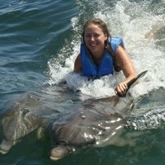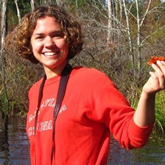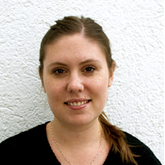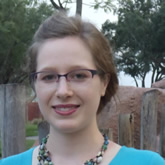
Advisor: Dr. Arnoldo Valle-Levinson
Civil and Coastal Engineering
Jackie Branyon received her B.S. degree in Civil Engineering from the University of Florida. Upon graduation, Jackie became a Civil Engineering Officer for the Florida Air National Guard, where she served as a first responder for natural disasters in the state. During that time, she enrolled in the Water Resources Engineering program at UF where she earned her M.S. While getting her Master’s degree, Jackie worked at Ocean Engineering Associates as an engineer-in-training, performing hydraulic analyses through 3D modeling. Jackie earned her Ph.D. in Coastal and Oceanographic Engineering in December 2015, working with Dr. Arnoldo Valle-Levinson. Her contributions to the WIGF program encompassed sea-level rise, saltwater intrusion, and availability of future freshwater resources. Her doctoral studies focus on the influence of circulation, tides, waves, and sea-level rise on submarine groundwater discharge from springs in a shallow fringing reef lagoon system.
View Jackie’s dissertation: Mixing and Transport in a Fringing Reef Lagoon

Advisor: Dr. Andrea Dutton
Geological Sciences
A native of Portage, Michigan, Peter Chutcharavan earned his B.S. in Geological Sciences at the University of Michigan before heading to Florida to pursue a Ph.D. with Dr. Andrea Dutton, researching past sea-level change. Peter’s research interests are paleoceanography, isotope geochemistry, geochronology and carbonate sedimentology. Peter’s worked with the WIGF program studying speleothems from the Yucatan Peninsula to better constrain maximum sea-level change in the region. He also compiled U/Th coral dates from existing literature to model uranium isotope variability in the oceans over the last 500 kyr. His doctoral dissertation research involved development and analysis of a database of coral U-Th measurements to constrain past sea level variability.
Vie Peter’s dissertation: Ice sheet histories and sea-level change during the Last Interglacial and Termination I inferred from fossil corals: an interdisciplinary approach.

Advisor: Dr. Zhong-Ren Peng
Urban & Regional Planning Department
Yujun Deng received his B.S. degree from Nanjing University of Technology, and received his M.S. degree from the University of Florida. Yujun is a Ph.D. student in the Urban & Regional Planning Department working with Dr. Zhong-Ren Peng. Prior to joining the WIGF program, Yujun studied the effect of sea-level rise on current building codes. His research interests included integrated impacts of human activities and rising sea-level on coastal water resources, adaptation planning in vulnerable areas, and effects of sea-level rise on infrastructure such as transportation. Yujun’s doctoral research focused on adaption planning, specifically cost-benefit analysis of strategies used to protect the coastal properties.
View Yujun’s dissertation: Human Mobility and Activity Patterns in Urban Areas under Routine and Extreme Conditions

Advisor: Dr. David Kaplan
School of Natural Resources and Environment
Katie Glodzik studied saltwater intrusion in salt marsh and coastal forest along Florida’s Big Bend, focusing on impacts to groundwater salinity, vegetation, and ecosystem structure. Her work attempted to distinguish between impacts from sea-level rise and from altered freshwater influence at the coast. Katie also examined how roads impact salt marsh salinity and vegetation by interrupting tidal flow. She earned her Master of Environmental Management (2013) from Duke University, with coursework in wetland ecology, geospatial and multivariate analysis, and biogeochemistry. For her Master’s thesis she employed a soil-core experiment to study saltwater intrusion impacts to wetland sediment biogeochemistry. Katie has prior consulting experience in sea-level rise analysis and natural-resource damage assessment. Katie’s doctoral dissertation research, working with Dr. David Kaplan, addressed saltwater intrusion impacts to salt marsh vegetation and coastal forest along the Big Bend of Florida.
View Katie’s dissertation: Impacts of Saltwater Intrusion and Hydrologic Change to Salt Marsh and Coastal Forest of Florida’s Big Bend

Advisor: Dr. Andrew Ogram
Soil and Water Science
Laibin earned his B.S. from University of Science and Technology – Beijing and his M.S. from Beijing Normal University. Laibin’s research interests included response of microbial communities in subterranean estuaries to inundation by saline seawater following sea-level rise; effects of changes in microbial communities on nutrient and metal species in surface estuaries; how changes in microbial function and physicochemical conditions of subterranean estuaries alter chemical composition of coastal aquifers, thereby affecting water quality of surface estuaries, groundwater resources, and cost of utilizing these resources; and resilience of microbial community structure and function at the changing saline/freshwater interface. Laibin’s doctoral dissertation research, working with Dr. Andy Ogram, investigated the effects of sea-level change on microbially mediated nitrogen cycling in subterranean estuaries.
View Laibin’s dissertation: Phylogenetic and Functional Diversity of Microbial Communities Associated with Submarine Groundwater Discharge

Advisor: Dr. Jon Martin
Geological Sciences
Andrea Pain earned her undergraduate degree from Wesleyan University and her Masters from ETH Zurich. Andrea’s undergraduate and graduate research focused on nutrient cycling in coastal marine environments as well as in agricultural soils. Her general research interests are related to sustainability in water and nutrient cycles in the face of climate change and sea-level rise. Andrea was interested in biogeochemical implications of sea-level rise and saltwater intrusion on coastal aquifers, and exploring the consequences for water supply, coastal nutrient cycling, and coastal ecosystems. Andrea’s doctoral dissertation research, working with Dr. Jonathan Martin, examined effects of sea-level rise on carbon and phosphorus cycling in subterranean estuaries: feedbacks and mineralogical controls.
View Andrea’s dissertation: Carbon Cycling in Subterranean Estuaries and Implications for Oceanic Fluxes

Advisor: Dr. Andrea Dutton
Geological Sciences
Alexandra Skrivanek received a B.S. in Earth and Environmental Sciences, with Minors in Oceanography and Museum Studies, from University of Michigan. Lexa’s doctoral dissertation research, working with Dr. Andrea Dutton, involved inferences of glacial-interglacial sea level variability from circum-Caribbean Last Interglacial coral reefs. Her research explored sea-level change during past warm periods of earth’s history in order to better understand sea-level and ice-sheet response to rapid global warming. At field sites in the Mexican Yucatán and Jamaica, Lexa measured age and elevation of fossil coral reefs from the circum-Caribbean region to assess timing and rate of sea-level rise during the Last Interglacial period, ~ 125,000 years ago, and test the hypothesis that sea level rapidly oscillated during this time. Lexa investigated patterns of chemical alteration of Caribbean, Last-Interglacial fossil corals to obtain more accurate and precise ages, and to determine the best coral species for geochemical analyses and dating.
View Alexandra’s dissertation: Inferences of Last Interglacial Sea-level Variability from circum-Caribbean Fossil Reefs

Advisor: Dr. Andrea Dutton
Geological Sciences
Karen Vyverberg received her B.S. from University of Florida, and her research interest was using geochemistry to study paleoclimate, then using that paleoclimate information to understand the climate change the Earth is currently experiencing. Karen’s doctoral dissertation research, working with Dr. Andrea Dutton, involved reconstructing the temporal evolution of global sea level during the last interglacial period (~125,000 years ago). Karen studied fossil coral reefs in the Seychelles and Florida Keys, where geochronology and paleo-shoreline GPS elevation measurements of fossil corals yield a relative sea level that can be used to determine overall global sea level during the Last Interglacial. Karen’s goal was to better constrain the timing and elevation of the global sea-level high stand during this time, and to determine if and when a sea-level oscillation occurred.
View Karen’s dissertation: Reconstructing the Temporal Evolution of Sea Level in the Seychelles during the Last Interglacial